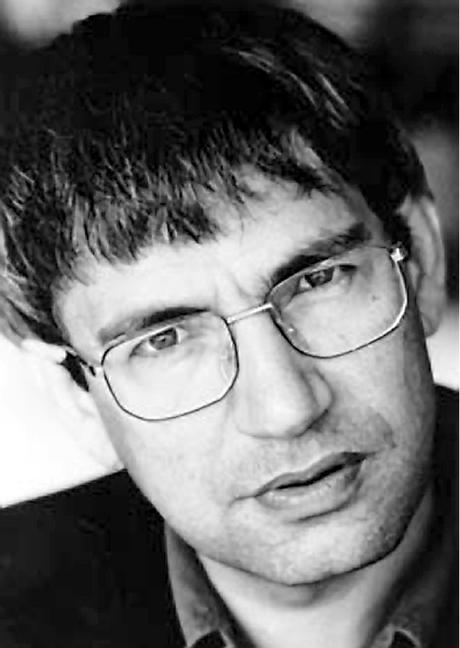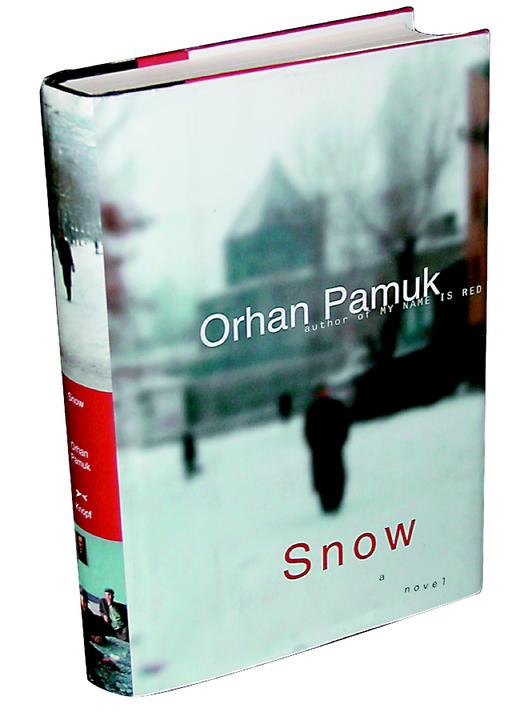It's a hard claim to deny. Generally speaking, authors who want to express their views on contemporary political topics should stick to writing op-ed pieces for newspapers. When they've written enough of them, they can compile them into a nonfiction book. Wedging heavy-handed political opinions into a work of fiction, on the other hand, all too often results in disaster.
You'd certainly expect a novel that revolves around the trendiest of current political topics—the conflict between the West and Islam—to be a dubious prospect for literary success. Thankfully, Pamuk is merely being cute by reprinting Stendhal's quote in his book. Snow isn't a veiled attempt to spread Pamuk's political ideas within the fragile trappings of literary fiction. This novel is a far more curious piece of work. Call it what you want, but you certainly can't call it crude.
A relatively well-known Turkish poet named Kerim Alakusoglu, who prefers to be called simply Ka (from his initials), has spent 12 lonely years as a political exile in Germany. He returns to Istanbul for his mother's funeral and is puzzled by the foreignness of his native land. Ka soon learns that in the remote eastern portions of the country girls have started committing suicide after being forbidden to wear head scarves at school.
A friend at an Istanbul newspaper gives the poet an assignment to travel to the tiny village of Kars, located near the Russian border, to report on the municipal elections and dig into the story of the head scarf girls. Ka takes the assignment largely because his gorgeous former classmate, Ipek, is currently living in Kars. Ipek recently separated from her husband, and Ka is hoping to put the moves on her.
He makes his way to Kars by bus in the middle of a snow storm. Shortly after his arrival, Ka learns that the entire village is snowed in and will be completely blocked off from the outside world for several days.
Isolated from the rest of the country, Kars immediately becomes a kind of winterland adult version of Lord of the Flies. Eager to prevent the election of an Islamist party representative, the authorities arrest and beat the tar out of the leading candidate in a blatant attempt at intimidation. Then the director of the Institute of Education, one of the main figures behind the unpopular head scarf policy, is assassinated by an Islamic extremist. Finally, a visiting experimental theater troupe decides to make a violent artistic statement in defense of Western secularism by hiring soldiers to open fire on a group of radical Islamist high school students in the middle of one of the troupe's performances. Soon the “little revolution of Kars” is well under way, and blood is running through the snowy streets.
While this is happening, Ka courts Ipek in a peculiar attempt to achieve the happiness that he's previously found so elusive, convincing her to return with him to Frankfurt after the snow thaws. Love sick, but surrounded by violence on all sides, Ka, who hasn't composed a single poem in several years, suddenly finds inspiration again. The perfect poems that begin pouring out of him seem to come from a source outside himself. For this reason, he begins toying with the idea of once again embracing the god of his youth.
One of the most interesting characters in the novel is the narrator, a friend of Ka's who is eventually revealed to be Pamuk himself. Pamuk traces the events of his friend's final years in an attempt to discover the location of Ka's lost Kars poems. In the process, he too gets wrapped up in the themes and characters fueling Kars' little revolution.
The frontline of the battle raging between the West and Islam isn't in Iraq. It isn't in the ruthless dictatorship of our president's friends in Saudi Arabia. It isn't in Afghanistan either, a country that barely has a concrete identity after being blown to rubble following two decades of brutal warfare.
The true frontline of the battle between Western-style pluralistic democracy and theocratic Islam is in Turkey, a country that's strategically wedged between East and West. Turkey has spent almost a century trying to find an appropriate balance between secularism and fundamental Islam, with little to show for its efforts.
A resident of Istanbul, Pamuk is currently Turkey's most renowned literary writer. He's an extraordinarily talented, inventive and subtle novelist. One reason Snow has captured so much attention is because Pamuk possesses the skill to transform his country into a powerful metaphor for the current global conflict between democracy and radical Islam. He shows in subtle detail that the conflict isn't as simple as Westerners might believe. In that sense, his book is both provincial and universal. He incorporates the local history of Kars as well as the national history of Turkey into his plot, but Snow clearly has wider implications.
That said, Snow is only barely a political novel. Like all good novels, this one has too many facets to address them all in a brief review. In addition to exploring the debate between secularism and Islamism without ever taking sides, Pamuk has crafted a clever love story with a mystical, religious bent.
Snow is also a straight-up mystery. Although, it starts out kind of slow, the last half of the book has enough nifty plot twists to satisfy readers merely looking for some entertaining narrative thrills.
As a protagonist, Ka is both passive and self-destructive, so it isn't always easy to sympathize with him. Likewise, the other characters in the novel often seem distant and unknowable. Snow is enjoyable not because its characters are finely crafted, but because of its fascinating structure, themes and plot. Yet Pamuk's ambitions transcend ordinary fiction. By the final pages, the novel has become an exploration of the shortcomings of the novel itself as a literary form. As one of the main characters says to Pamuk, “If you write a book set in Kars and put me in it, I'd like to tell your readers not to believe anything you say about me, anything you say about any of us. No one could understand us from so far away.”
Both as an author and as a character in his novel, Pamuk shows us that literary fiction involves a certain level of presumptuousness. The quality that sets the novel apart from other art forms is that novels can give readers the realistic illusion of inhabiting another person's psyche. Sadly, as Pamuk goes to great lengths to illustrate, we can't ever truly inhabit anyone else's psyche. The best we can hope for are clever literary illusions.










